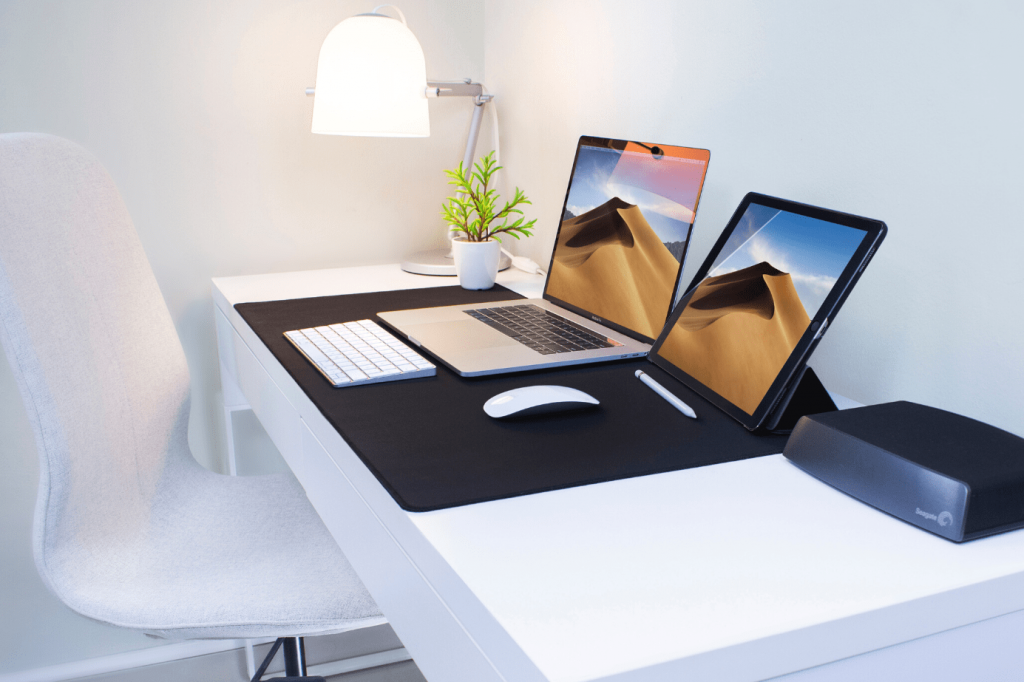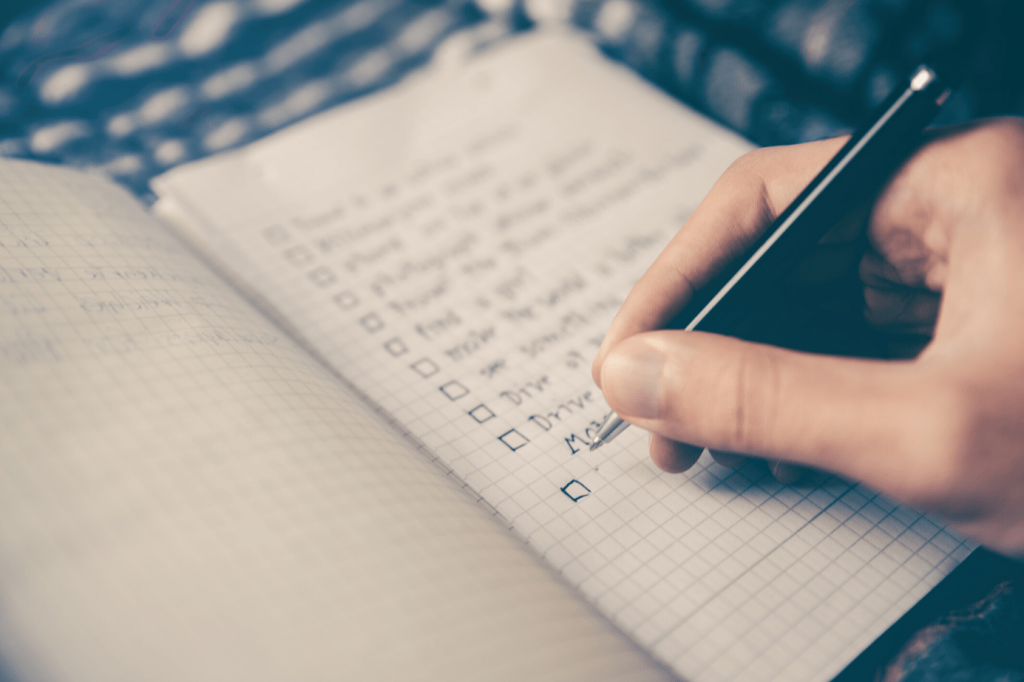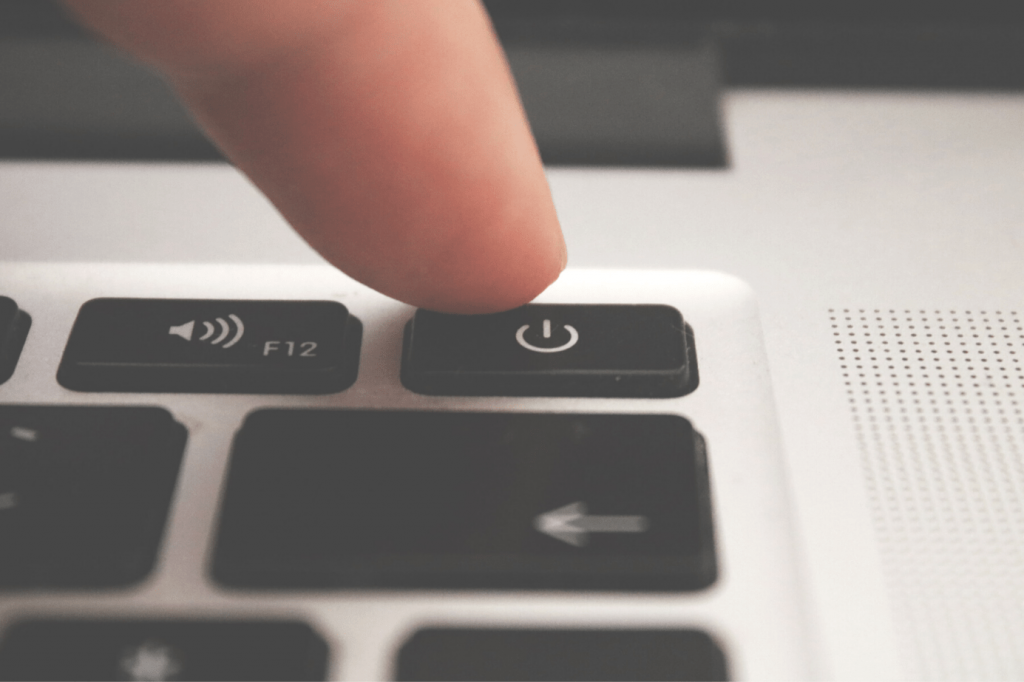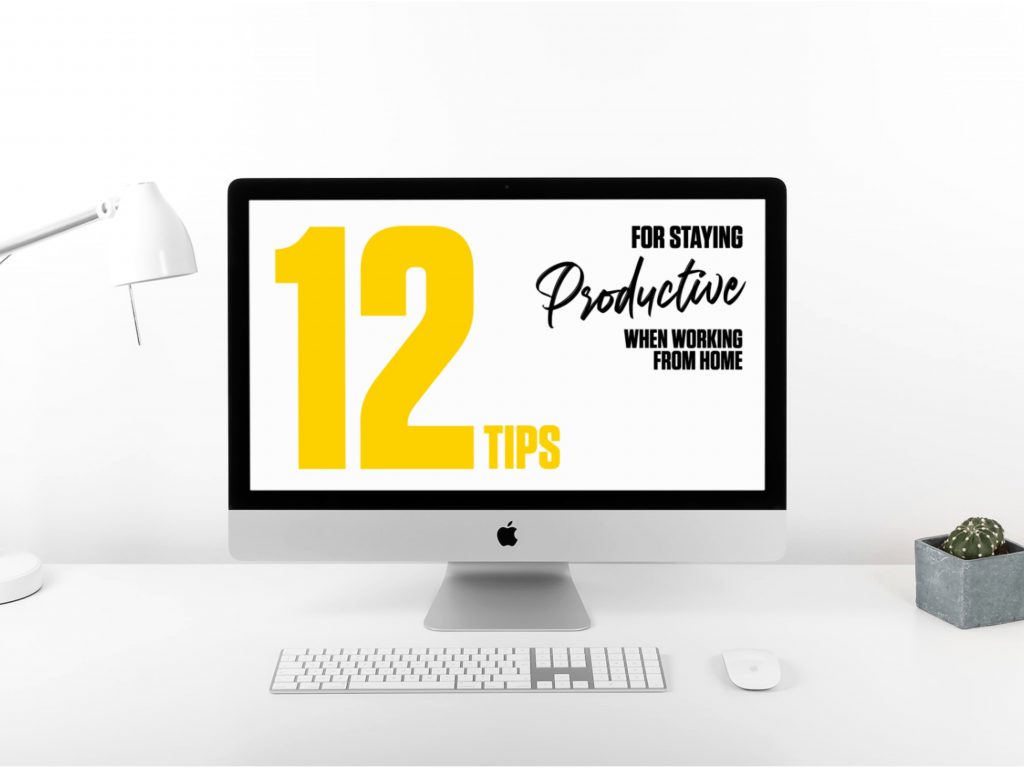Over the past few weeks, due to the recent changes in our current climate, many of us have found ourselves adjusting to a new routine of working from home.
We’ve swapped our desks for our kitchen table and our supportive colleagues for our loved ones. There are many benefits to working from home, but without the conditioned discipline of our regular offices and work spaces, our productivity could take an unfortunate hit.
Our surroundings may change but our deadlines remain the same. So how do we acclimatise to the place we already know so well? Keep reading to discover our top 12 tips for staying productive when working from home.

1. Avoid working from your bed
Working from your bed might seem like a luxury, but really, it’s one of the worst habits we can get into for channeling productivity. Waking up and diving straight into work without letting your body properly “get up”, makes it hard for your brain to register that it’s in work mode.
You might not be conscious of it, but your morning work routine sets you up for a day’s work by letting your body know that it’s time to be productive. By eliminating your routine and staying in bed, you’ll struggle to feel fully awake or focused. If you can, think of your bedroom as your out-of-work space, and stay away until you’ve completed your working day.
2. Get ready like you’re going to work
Try to keep your morning routine similar to what you would normally do. Wake up, brush your teeth and wash your face, get dressed (proper clothes, no loungewear sorry), have your breakfast.
Keeping in this routine not only gives you time to focus up, it ensures you’re staying healthy mentally and physically. Something we can all struggle with in times like these.
Your commute to work plays an important part in getting you into the right mindset, so consider putting in an activity to replace that journey. Find something that suits you, like running, yoga or even a morning crossword with breakfast. Something that engages your body and mind will help you kickstart the day the right way.

3. Find a dedicated work spot
The best way to stay on task is to create your own home office space. It doesn’t have to be elaborate, as long as it’s separate from where you spend your leisure time.
Stay away from your sofa, keep Netflix out of sight and close the door to keep out any noisy members of your household. If you don’t have the luxury of closing the door to the rest of your home, enact discipline about desk hours and TV hours being totally separate. And make sure that the desk is just for work, not lunch or play.
Set up at your dining or kitchen table, or create a little work nook in a corner with your furniture. If you’re lucky enough to have a spare room, transform it into a little home office.
Consider the lighting, as you’ll want plenty of natural light but not too much direct sunlight. The glare on your screen will only be a distraction. Close your blinds if your surroundings are proving to be more distracting than useful and find yourself a supportive chair that’s not too comfy.
4. Clear your environment
If you’ve got dirty dishes stacked in your kitchen and piles of dirty laundry dotted around your home, they can drag you away from concentration and instead become a domestic distraction. They might serve as reminders of what household chores you need to complete, and you might just struggle to save them for later.
Keep your home office space tidy and don’t give yourself the opportunity to procrastinate. This will help you to focus on your workload and simulate a more authentic office environment.
If you’re a creative, then you might welcome a bit of mess. However, household clutter is very different to the artwork that you have scattered over your office desk.

5. Make a list of priorities for the day
Knowing what you need to complete for the day can be the best form of motivation. And that’s not just because we like making lists.
Set yourself a list of tasks that you know you need to action before the end of the day and think of them as goals.
Giving yourself something to work towards can be the driving force you need to keep going. If you’re falling into a slump, remind yourself of these priorities.
6. Have a routine
While the first few days of working from home may seem alien and unfamiliar, it’s good to get a feel for how you want to schedule your day. Trial your routine to find out what works for you. If you don’t have set working times, be strict with yourself by imposing your own starting and finishing hours.
We’ve already talked about the importance of a morning routine that wakes you up and engages your brain, but the rest of the day needs just as much structure or that effort will soon go to waste. If you have a pet, your lunch break could be a great time to take them for a walk and to get some fresh air. If you work around calls and virtual meetings, perhaps you take them into a different space from your working area to create a feeling of being in the office.
Working from home is all about finding what works for you and the best way to get the most out of you from your surroundings. We’re all dealing with different obstacles in every home, so let each day teach you something new about what works for yours.
7. Have lunch away from your desk
There’s never been a better time to take your lunch away from your desk. Being at home 24/7 means that it can be hard to differentiate the different parts and activities of your day.
If you’ve set restrictions on working from your bedroom, do the same for your lunch. Make a point to eat your lunch and spend your down time in a new part of your home. Even if this means switching from desk chair to sofa in the same room, it helps your brain to shut off each part of your day and prepare for the next.

8. Take regular breaks
When you’re in your regular office, you don’t appreciate how often you have a break away from your screen. From walking to the toilets to making your way to the kitchen for a cup of coffee, you move away from your screen more often than you think.
At home, your movements are much more limited. You might even forget to take a break altogether. And no, scrolling on social media or opening up YouTube is not a proper break. Give your eyes a rest and step away from your desk. Every hour and a half, take a few minutes to walk up and down your stairs or have a face-to-face conversation with someone, if you can.
Breaking up your day and giving your mind a chance to refresh is key to maintaining high productivity levels, otherwise you’ll burn out.
9. Set boundaries
You might’ve heard people advise you to keep your personal and professional life separate, and we mean it in more ways than one.
If you have family or friends around in your home, let them know that you’re working and don’t want to be disturbed. An unexpected question is enough to break your concentration, so set boundaries with the people around you to avoid distractions, and let them know what you need to stay focused.
Being at home makes it seem like you can wait in for the postman, or put a load in the machine and get a wash going in the dishwasher, but that’s not what your priority is during working hours. Be disciplined in saving these chores for until after you’ve finished for the day, or schedule them to coincide with your breaks.

10. Find a way that’s not your phone to stay connected
Communication with your team is integral to not only being productive, but for the wider success of your office. If you’re lucky enough to be mobile and continue your working operations away from the office, remember to open up lines of communication throughout the day.
Just make sure it’s not on your mobile phone or via an informal WhatsApp group chat. If you use your phone to message your colleagues, you may be tempted to scroll right onto your social media platforms. And Instagram’s never productive, unless you’re in the social media industry.
11. Check in with your team at the end of the day
Even if you’re in regular communication with your colleagues throughout the day, don’t be afraid to check in with them when you clock out.
Working from home can feel isolating, so reaching out to others is crucial for staying positive and productive. It’s also a good time to raise any concerns you or your peers might be having. Air these out so you can look to find a solution.

12. Log off properly
We mean this in all senses of the word. Power off your laptop or computer properly – yes, shut it down and unplug it – but also sign out from your work mentally. Work-life balance has never been more important than when you’re literally living where you work, and vice versa.
Give yourself an action to complete or a phrase to say that indicates to your brain that you’re finished for the day. Let it know that it’s time to stop. If you have a Eureka moment at 8:30pm, note it down to pick up the next day. You might be able to access your work at any time, but that doesn’t mean that you have to be logged in all the time.
You wouldn’t go all the way back to the office if you had suddenly thought up a great idea, so don’t do it at home. We all need time to unplug, regardless of where we are working.
For more insights on thriving whilst working from home, check out The Cotswold Company ‘Guide to creating a healthy and productive workspace at home‘.
It’s important to stay connected when we need to the most. Whether you’re working from home or simply staying at home, we want to help you feel in touch with what’s going on here at Use.Space. Follow us on Instagram for the latest updates or to just drop us a hello. We’d love to hear from you!
